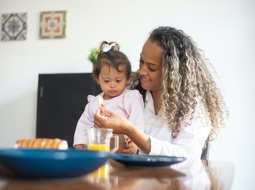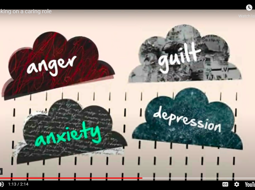Caring for someone with cancer
A cancer diagnosis can come as a huge shock for family members as well as the person with cancer. We have compiled caring tips and information from some leading charities that can offer help.
Where can I find specialist support?
Organisations like the Macmillan Cancer Support and Cancer Research UK offer an array of useful resources, confidential expert advice and support for everyone affected by cancer.
Here are some useful links of the contact information of charities that specialise in different areas. Please note that this list isn't exhaustive and there are other organisations that can also provide assistance. For ease of reference, the charities below have been listed in alphabetical order:
Action Cancer (NI)
Offers support services to children and adults affected by cancer in Northern Ireland, at any stage of their cancer journey.
T 028 9080 3344
E info@actioncancer.org www.actioncancer.org
Blood Cancer UK
The UK's specialist blood cancer charity, providing practical and emotional support to anyone affected by blood cancer.
T 0808 2080 888 open weekdays, 10am to 4pm and weekends and bank holidays between 10am and 1pm www.bloodcancer.org.uk
Bowel Cancer UK
A charity which provides information and support for people affected by bowel cancer. T 020 7940 1760 (not a helpline) www.bowelcanceruk.org.uk
Breast Cancer Care
Providing care, information and support to people affected by breast cancer.
T 0808 800 6000
www.breastcancercare.org.uk
Breast Cancer Haven
An organisation which provides counselling and therapies for people affected by breast cancer.
T 0300 012 0112
www.breastcancerhaven.org.uk
Breast Cancer Now
Offers award-wining information resources about breast cancer diagnosis and treatment or breast health. Breast care nurses provide tailored information and specialist support to anyone affected by breast cancer or with queries about breast health.
T 0808 800 6000 weekdays, 9am to 4pm, and Saturday between 9am and 1pm
E hello@breastcancernow.org
www.breastcancernow.org
Cancer Black Care
Offers UK-wide information and support for people from Black and ethnic minority communities who have cancer, as well as their friends, carers and families.
T 020 8961 4151
www.cancerblackcare.org.uk
Cancer Focus Northern Ireland
A charity that provides care and support for people with cancer and their families. Includes counselling, group support and transport to hospital services.
T 0800 783 3339 Monday, Wednesday and Friday, 9am - 1pm E nurseline@cancerfocusni.org
www.cancerfocusni.org
Cancer Hair Care
A charity which offers advice and support on all aspects of hair loss, hair loss prevention (scalp cooling) and hair care, before, during and after cancer treatments.
T 01438 311 322
www.cancerhaircare.co.uk
Cancer Research UK
A cancer research and awareness charity for anyone affected by any kind of cancer.
T 0808 800 4040
www.cancerresearchuk.org
Cancer Support Scotland
Runs cancer support groups throughout Scotland and offers free complementary therapies and counselling to anyone affected by cancer.
T 0800 652 4531 weekdays, 9am to 5pm E info@cancersupportscotland.org www.cancersupportscotland.org
CLIC Sargent
UK cancer charity for children, young people and their families. They provide clinical, practical, financial and emotional support to help people cope with cancer and get the most out of life.
T 0300 330 0803 open weekdays, 9am to 5pm www.clicsargent.org.uk
The Eve Appeal
Information and support for those affected by gynaecological cancers.
T 020 7605 0100
www.eveappeal.org.uk
Jo’s Cervical Cancer Trust
UK charity dedicated to women affected by cervical cancer and cervical abnormalities.
T 0808 802 8000
www.jostrust.org.uk
Kidney Cancer UK
Information and support for people affected by kidney cancer. T 0800 002 9002 (for care line) open weekdays, 9am to 4pm
T 0300 102 0101 (for counselling service) open weekdays, 9am to 5pm www.kcuk.org.uk
Leukaemia Care
Leukaemia Care is a national blood cancer charity that provides emotional support, advice and help to anyone affected by a blood cancer.
T 08088 010 444
www.leukaemiacare.org.uk
Look Good Feel Better
A worldwide cancer support charity proving practical support for women struggling with side effects from treatment. It offers free skincare and make-up workshops.
www.lookgoodfeelbetter.co.uk
Lymphoedema Support Network (LSN)
The LSN is a registered charity run by people who live with lymphoedema and is the largest information provider about the condition in the UK.
T 020 7351 4480
www.lymphoedema.org
Macmillan Cancer Support
Information and support for people living with cancer, their families and carers.
T 0808 808 00 00
www.macmillan.org.uk/cancer-information-and-support/get-help/financial-and-work/carers
Maggie's Centres
Free practical, emotional and social support to people with cancer and their carers.
T 0300 123 1801
maggies.org/cancer-support/supporting-someone-cancer/
Myeloma UK
Myeloma UK offers information and support to people affected by myeloma.
T 0800 980 3332
www.myeloma.org.uk
OcuMel UK
A charity which provides information and emotional support for those affected by ocular melanoma via its website, helpline and online forums.
T 0300 790 0512
www.ocumeluk.org
Orchid
A charity which promotes awareness and provides support for those affected by penile, testicular and prostate cancer.
T 0808 802 0010
E info@orchid-cancer.org.uk
www.orchid-cancer.org.uk
Pancreatic Cancer UK
Provides expert, personalised support to people affected by pancreatic cancer via their Support Line and through their information. They also have an online forum and provide local face to face support through their Living with Pancreatic Cancer Support Days.
T 0808 801 0707 weekdays, 9am to 5pm www.pancreaticcancer.org.uk
Penny Brohn UK
Offers physical, emotional and spiritual support across the UK, using complementary therapies and self-help techniques.
T 0303 3000 118 weekdays, 9.30am to 5pm E helpline@pennybrohn.org.uk
www.pennybrohn.org.uk
Prostate Cancer UK
Information and support for those affected by prostate cancer.
T 0800 074 8383
www.prostatecanceruk.org
RipRap
Information for teenagers who have a parent with cancer. The website also features real stories of other young people's experiences.
www.riprap.org.uk
Roy Castle Lung Foundation
Information and support for people affected by lung cancer.
T 0333 323 7200
www.roycastle.org
Sarcoma UK
Offers information and support for people living with sarcoma, including support groups and a helpline.
T 0808 801 0401
www.sarcoma.org.uk
Target Ovarian Cancer
A charity which supports those affected by ovarian cancer. Includes a nurse-led support line.
T 020 7923 5475
www.targetovariancancer.org.uk
Teenage Cancer Trust
Improves the quality of life and chances of survival for young people with cancer, with support and specialist services around the UK.
T 020 7612 0370
www.teenagecancertrust.org
Tenovus
Provides treatment, emotional support and practical advice to people affected by cancer. The charity's mobile support units bring cancer treatment into homes and communities. T 0808 808 1010 daily 8am to 8pm
E info@tenovuscancercare.org.uk
www.tenovuscancercare.org.uk
The Youth Cancer Trust
Provides support and free, activity-based holidays for young people aged 14 to 30 with cancer or any malignant disease in the UK and Irish Republic or who are patients of any UK hospital. You can also come on a holiday if you have been in remission for up to five years or are living with the late effects of having had cancer as a teenager.
T 01202 763 591
www.youthcancertrust.org
We have just referenced a few general helplines here. You may wish to refer to the 'Directory of specialist cancer charities' above to find a specific helpline:
Macmillan Support helpline:
www.macmillan.org.uk/cancer-information-and-support/get-help
www.macmillan.org.uk/cancer-information-and-support/get-help/financial-and-work/carers
Cancer Research helpline: www.cancerresearchuk.org/about-us/contact-us/talk-to-our-nursesmencap.org.uk/advice-and-support/learning-disability-helpline
You may need support for your own wellbeing too. The following sources of help may be useful:
Macmillan Cancer Support:
www.macmillan.org.uk/cancer-information-and-support/supporting-someone/practical-support-for-carers/getting-support-as-a-carer
www.macmillan.org.uk/cancer-information-and-support/supporting-someone/emotional-support-for-carers
Cancer Research UK:
www.cancerresearchuk.org/about-cancer/coping/family-friends-caregivers/taking-care-of-yourself
Maggie's:
www.maggies.org/cancer-support/our-support/friends-and-family/
Carers UK:
There may be others who will be in a similar situation to you. Our free Carers UK Care for a Cuppa sessions offer an opportunity to connect with other carers, and you can find out more about relevant issues and ways to address them through our Share and Learn sessions:
Your health and wellbeing guidance
Our guides and sources of support
Cancer and nutrition
We have some information pages and a guide to help you ensure that the person you're caring for has a good balance of nutrition which can be a challenge if someone is struggling with a loss of appetite, comfort eating or feeling the side effects of medication.
See our online page: Eating well and cancer
Managing medication and health needs
This video explores some of the ways you can help with managing someone's medication needs. It can be confusing if one person is taking more than one type at different times. We also share some general tips provided by carers to help you feel more organised and manage your time well.
Support with day-to-day life
It's also a good idea to request a needs assessment if the person you are looking after hasn't already had one. The term for this may differ depending on where you live, but essentially this is a review of someone's needs, looking at what will help improve their day-to-day life.
As an unpaid carer, you may also be eligible for a needs assessment. If you are struggling with health issues and are under strain, you can also request one for yourself. You can have this as well as a carer’s assessment.
Depending on where you live, there may be a waiting list for this support. It is worth checking with your local authority or health and social care trust (in Northern Ireland).
Arranging care for someone
If you reach a point, where you need additional support to look after someone, there are various options to consider. Everyone's circumstances are different so it may be a case of trial and error at first. However we hope to make these difficult decisions easier for you by providing lots of guidance and information to help you make informed choices.
Using a care agency can be more expensive than employing a care worker directly, but there are certain responsibilities to fulfil if you are taking on the role of an employer to recruit someone directly. See our online pages for more information and guidance:
Fore more information about finding care agencies, see this page.
For more information about directly employing a care professional, see this page.
You can explore other options on our arranging care for someone page.
How do I take time out?
If you feel in need of a break, it can be difficult but try not to feel guilty about making this happen. Often, it is easier to put the needs of those we care for before our own.
See our webpage, Taking a break, for some ideas on how to take some time out. On this page, you can also download a factsheet with organisations that can help with offering a break or finding respite care.
Connecting with others
You can connect to our forum, Carers Connect, to read what others have experienced and share tips. You might find it helpful to search for specific terms to find threads with relevant discussion.
To post topics or join a conversation on our forum, you need to become a member first. This is free and can give you access to some additional support in case you need it – see this link: join us.





